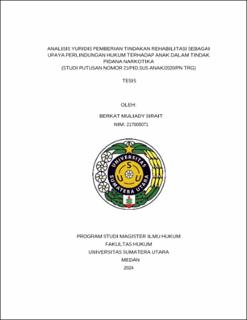| dc.contributor.advisor | Ekaputra, Mohammad | |
| dc.contributor.advisor | Trisna, Wessy | |
| dc.contributor.advisor | Andriati, Syarifah Lisa | |
| dc.contributor.author | Sirait, Berkat Muliady | |
| dc.date.accessioned | 2024-08-02T07:55:38Z | |
| dc.date.available | 2024-08-02T07:55:38Z | |
| dc.date.issued | 2024 | |
| dc.identifier.uri | https://repositori.usu.ac.id/handle/123456789/94731 | |
| dc.description.abstract | The problem that often occurs in Indonesia is that narcotics cases in children are not given legal protection and many of these cases children are actually given sentences in prison. The formulation of the problem of this research is how the legal arrangements on the provision of rehabilitation measures for children in narcotics crimes, how legal protection efforts against children in narcotics crimes, how the application of punishment against children who use drugs in decision number 21/Pid.Sus-Children/2020 /PN. TRG. The purpose of this study is to determine the legal arrangements for the provision of rehabilitation measures for children in narcotics crimes, how legal protection efforts for children in narcotics crimes, how the application of crimes against drug-using children in decision number 21/Pid.Sus-Children/2020/ PN. TRG.
This research uses normative juridical research methods or doctrinal research. The results of the study that rehabilitative law enforcement against narcotics addicts and narcotics abuse in children based on the Narcotics Law needs to be a law enforcement without detaining and giving prison sentences but given an alternative, namely by placing narcotics addicts into rehabilitation institutions.
The application of punishment against children who use drugs in decision no. 21/Pid.Sus Children/2020/PN.TRG provides a rehabilitation sentence after imprisonment for 4 months on the child. Rehabilitation is not applied during investigation and prosecution. The application of rehabilitation is only carried out after the verdict of the Panel of Judges, which is accompanied by a sentence of imprisonment. With this, the Tenggarong District Court can be considered inconsistent in applying restorative justice to children who face the law. This is already regulated in the legal arrangements on the provision of rehabilitation measures for children in narcotics crimes regulated under Article 54 of Law Number 35 of 2009 concerning Narcotics and Circular Letter of the Supreme Court of the Republic of Indonesia Number: 4 of 2010 concerning Placement of Abuse. | en_US |
| dc.language.iso | id | en_US |
| dc.publisher | Universitas Sumatera Utara | en_US |
| dc.subject | Narcotics | en_US |
| dc.subject | Legal Protection of Children | en_US |
| dc.subject | Rehabilitation | en_US |
| dc.subject | SDGs | en_US |
| dc.title | Analisis Yuridis Pemberian Tindakan Rehabilitasi sebagai Upaya Perlindungan Hukum terhadap Anak dalam Tindak Pidana Narkotika (Studi Putusan Nomor 21/PID.SUS ANAK/2020/PN TRG) | en_US |
| dc.title.alternative | Juridical Analysis of Providing Rehabilitation Measures as A Legal Protection Measure for Children in Narcotics Crimes (Study Decision Number 21/PID.SUS Children/2020/PN TRG) | en_US |
| dc.type | Thesis | en_US |
| dc.identifier.nim | NIM217005071 | |
| dc.identifier.nidn | NIDN0005107104 | |
| dc.identifier.nidn | NIDN0123018601 | |
| dc.identifier.nidn | NIDN0011098402 | |
| dc.identifier.kodeprodi | KODEPRODI74101#Ilmu Hukum | |
| dc.description.pages | 132 Pages | en_US |
| dc.description.type | Tesis Magister | en_US |


